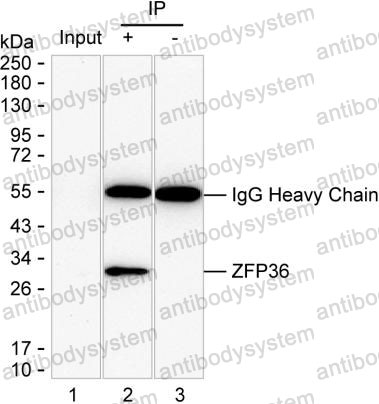Catalog No.
RHD71702
Species reactivity
Human
Host species
Mouse
Isotype
IgG2a
Clonality
Monoclonal
Tested applications
IP: 1:100-1:200, WB: 1:500-1:1000
Target
Zinc finger protein 36, RNF162A, TIS11A, Growth factor-inducible nuclear protein NUP475, Zfp-36, ZFP36, G0/G1 switch regulatory protein 24, G0S24, Tristetraprolin, NUP475, mRNA decay activator protein ZFP36, TTP
Concentration
1 mg/ml
Endotoxin level
Please contact with the lab for this information.
Purity
>95% as determined by SDS-PAGE.
Purification
Protein A/G purified from cell culture supernatant.
Accession
P26651
Applications
IP, WB
Form
Liquid
Storage buffer
0.01M PBS, pH 7.4, 0.05% Sodium Azide.
Stability and Storage
Use a manual defrost freezer and avoid repeated freeze-thaw cycles. Store at 4°C short term (1-2 weeks). Store at -20°C 12 months. Store at -80°C long term.
Clone ID
R3H14
ZFP36-family RNA-binding proteins in regulatory T cells reinforce immune homeostasis., PMID:40328742
Senescence-induced p21high macrophages contributed to CD8+ T cells-related immune hyporesponsiveness in kidney transplantation via Zfp36/IL-27 axis., PMID:40234384
Copy number variation and clinical response to chemotherapy and bevacizumab in the Czech metastatic colorectal cancer patients., PMID:39174331
The RNA binding proteins ZFP36L1 and ZFP36L2 are dysregulated in airway epithelium in human and a murine model of asthma., PMID:37928904
Tristetraprolin overexpression drives hematopoietic changes in young and middle-aged mice generating dominant mitigating effects on induced inflammation in murine models., PMID:37535204
RNA Sequencing Reveals Beneficial Effects of Atorvastatin on Endothelial Cells in Acute Kawasaki Disease., PMID:35861833
Cisplatin resistance of NSCLC cells involves upregulation of visfatin through activation of its transcription and stabilization of mRNA., PMID:34656559
Regulated Tristetraprolin Overexpression Dampens the Development and Pathogenesis of Experimental Autoimmune Uveitis., PMID:33569048
Tristetraprolin Regulates TH17 Cell Function and Ameliorates DSS-Induced Colitis in Mice., PMID:32922402
Dynamics of peripheral T cell clones during PD-1 blockade in non-small cell lung cancer., PMID:32591861
Maintenance of the marginal-zone B cell compartment specifically requires the RNA-binding protein ZFP36L1., PMID:28394372
RNA-binding proteins ZFP36L1 and ZFP36L2 promote cell quiescence., PMID:27102483
Enhanced stability of tristetraprolin mRNA protects mice against immune-mediated inflammatory pathologies., PMID:26831084
Sustained interleukin-1β exposure modulates multiple steps in glucocorticoid receptor signaling, promoting split-resistance to the transactivation of prominent anti-inflammatory genes by glucocorticoids., PMID:25977599
Differential expression and functional analysis of the tristetraprolin family during early differentiation of 3T3-L1 preadipocytes., PMID:22701344
A synonymous polymorphism of the Tristetraprolin (TTP) gene, an AU-rich mRNA-binding protein, affects translation efficiency and response to Herceptin treatment in breast cancer patients., PMID:21875902
Constitutive ERK activity induces downregulation of tristetraprolin, a major protein controlling interleukin8/CXCL8 mRNA stability in melanoma cells., PMID:21593445
Involvement of Tis11b, an AU-rich binding protein, in induction of apoptosis by rituximab in B cell chronic lymphocytic leukemia cells., PMID:19092855
Production and characterization of ZFP36L1 antiserum against recombinant protein from Escherichia coli., PMID:18302406
Inhibition of TGF-beta signaling by IL-15: a new role for IL-15 in the loss of immune homeostasis in celiac disease., PMID:17324400
Expression, purification, and biochemical characterization of the antiinflammatory tristetraprolin: a zinc-dependent mRNA binding protein affected by posttranslational modifications., PMID:15504035
[Analysis of the kinetic of expression of tristetraprolin and HuR by rheumatoid arthritis patients peripheral blood mononuclear cells stimulated with lipopolysaccharide]., PMID:15309217
Herpes simplex virus 1 induces cytoplasmic accumulation of TIA-1/TIAR and both synthesis and cytoplasmic accumulation of tristetraprolin, two cellular proteins that bind and destabilize AU-rich RNAs., PMID:15280467
Expression of tristetraprolin (G0S24) mRNA, a regulator of tumor necrosis factor-alpha production, in synovial tissues of patients with rheumatoid arthritis., PMID:15170914
Regulation and localization of endogenous human tristetraprolin., PMID:12823857
Analysis of the function, expression, and subcellular distribution of human tristetraprolin., PMID:12115244
Members of the tristetraprolin family of tandem CCCH zinc finger proteins exhibit CRM1-dependent nucleocytoplasmic shuttling., PMID:11796723
HuA and tristetraprolin are induced following T cell activation and display distinct but overlapping RNA binding specificities., PMID:11602610
Roles of tumor necrosis factor-alpha receptor subtypes in the pathogenesis of the tristetraprolin-deficiency syndrome., PMID:11588035
Bone marrow transplantation reproduces the tristetraprolin-deficiency syndrome in recombination activating gene-2 (-/-) mice. Evidence that monocyte/macrophage progenitors may be responsible for TNFalpha overproduction., PMID:9276715
A pathogenetic role for TNF alpha in the syndrome of cachexia, arthritis, and autoimmunity resulting from tristetraprolin (TTP) deficiency., PMID:8630730
Schizosaccharomyces pombe zfs1+ encoding a zinc-finger protein functions in the mating pheromone recognition pathway., PMID:8534915
Protein kinase C isozyme distribution and down-regulation in relation to insulin-stimulated c-fos induction., PMID:8063739


